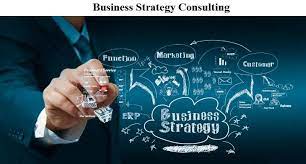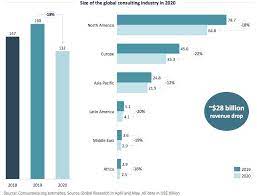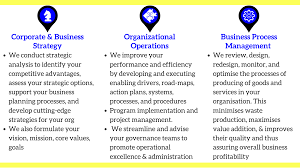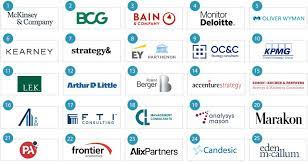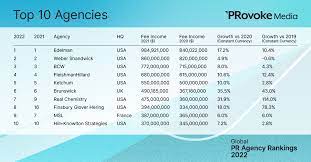Title: The Role of a Strategy Consultant in Shaping Business Success
Introduction:
In today’s fast-paced and highly competitive business landscape, companies face numerous challenges in achieving sustainable growth and maintaining a competitive edge. This is where the expertise of a strategy consultant becomes invaluable. A strategy consultant plays a crucial role in helping businesses navigate complex market dynamics, identify opportunities, and develop effective strategies to achieve their goals. In this article, we will explore the key responsibilities and benefits of working with a strategy consultant.
Understanding the Business Landscape:
A strategy consultant begins by thoroughly understanding the client’s business model, industry dynamics, and competitive landscape. This involves conducting comprehensive research, gathering data, and analysing market trends. By gaining deep insights into these factors, consultants can identify potential risks and opportunities that may impact the client’s strategic decisions.
Developing Strategic Plans:
Once armed with valuable insights, strategy consultants work closely with their clients to develop tailored strategic plans. These plans encompass long-term objectives as well as short-term goals that align with the company’s vision. Consultants help define clear action steps, allocate resources efficiently, and establish measurable key performance indicators (KPIs) to track progress.
Identifying Growth Opportunities:
One of the primary roles of a strategy consultant is to identify growth opportunities for their clients. This involves assessing market gaps or untapped segments that can be leveraged for expansion. Through thorough analysis and innovative thinking, consultants help businesses explore new markets, diversify product offerings, or enhance existing operations to drive revenue growth.
Optimizing Operations:
Strategy consultants also focus on streamlining internal processes and optimizing operations within an organization. They assess existing workflows, identify bottlenecks or inefficiencies, and recommend improvements that can enhance productivity and reduce costs. By implementing best practices and utilizing technology effectively, consultants enable businesses to operate more efficiently.
Navigating Change:
In an ever-changing business landscape, adaptability is key to survival. Strategy consultants play a vital role in guiding businesses through periods of change, such as mergers, acquisitions, or industry disruptions. They provide expert advice and support in managing transitions smoothly, minimizing risks, and maximizing opportunities that arise from these changes.
Measuring Success:
A strategy consultant’s job does not end with the implementation of strategic plans. They also help measure the success of these initiatives by monitoring KPIs and evaluating their impact on the business. Consultants provide regular progress reports and conduct performance reviews to ensure that strategies are delivering the desired outcomes. If necessary, they can make adjustments to the plans to keep them aligned with changing market conditions.
Conclusion:
In a dynamic business environment where staying ahead is crucial for success, partnering with a strategy consultant can be a game-changer for any organization. Their expertise in analysing markets, developing effective strategies, identifying growth opportunities, optimizing operations, and navigating change can significantly impact a company’s bottom line and long-term success. By leveraging their insights and experience, businesses can make informed decisions that drive growth and secure a competitive advantage in today’s complex marketplace.
5 Essential Tips for Becoming a Successful Strategy Consultant
- Develop a strong understanding of the industry and its trends – keep up to date with any changes that may affect your client’s business.
- Learn to think strategically – be able to identify opportunities and develop solutions for clients that will help them meet their goals.
- Have excellent communication skills – be able to present complex information in an easy-to-understand way, both verbally and in writing.
- Be organised and have good time management skills – you need to be able to manage multiple projects at the same time, often under tight deadlines.
- Have strong problem solving abilities – you need to be able to analyse data quickly and accurately, identify problems, develop solutions and recommend strategies for improvement
Develop a strong understanding of the industry and its trends – keep up to date with any changes that may affect your client’s business.
Staying Ahead: The Importance of Industry Knowledge for Strategy Consultants
In the ever-evolving business landscape, strategy consultants play a vital role in helping companies navigate challenges and achieve their goals. One key tip that sets successful strategy consultants apart is the development of a strong understanding of the industry and its trends. By keeping up to date with any changes that may affect their client’s business, consultants can provide valuable insights and develop effective strategies that drive success.
Developing a deep understanding of the industry is essential for strategy consultants to provide relevant and impactful advice. By staying informed about market trends, emerging technologies, regulatory changes, and consumer preferences, consultants can identify potential risks and opportunities that may impact their clients’ strategic decisions.
To stay ahead in today’s fast-paced world, it is crucial for strategy consultants to continuously update their knowledge base. This can be done through various means such as attending industry conferences, participating in webinars or workshops, reading industry publications, and actively engaging with thought leaders in the field. By immersing themselves in the industry ecosystem, consultants gain valuable insights into market dynamics and can anticipate future trends.
Keeping up to date with industry changes not only benefits the consultant but also provides immense value to clients. Clients rely on strategy consultants to provide them with accurate information and guidance based on current market conditions. By having a finger on the pulse of the industry, consultants can offer timely advice that aligns with emerging opportunities or mitigates potential threats.
Moreover, an in-depth understanding of industry trends allows strategy consultants to bring fresh perspectives to their clients’ businesses. They can identify innovative approaches or new market segments that clients may not have considered before. This enables businesses to stay competitive by adapting quickly to changing customer demands or disruptive technologies.
Additionally, being knowledgeable about industry trends helps build credibility and trust with clients. When clients see that their consultant is well-informed about their specific sector and understands its intricacies, they are more likely to have confidence in the consultant’s recommendations. This enhances the consultant-client relationship and fosters a collaborative environment for achieving shared goals.
In conclusion, developing a strong understanding of the industry and its trends is a crucial tip for strategy consultants. By staying up to date with changes that may affect their clients’ businesses, consultants can provide valuable insights, develop effective strategies, and drive success. Continuous learning and engagement with industry developments enable consultants to bring fresh perspectives, anticipate market shifts, and deliver impactful results. Embracing this tip will not only benefit strategy consultants but also empower their clients to thrive in today’s dynamic business environment.
Learn to think strategically – be able to identify opportunities and develop solutions for clients that will help them meet their goals.
Developing strategic thinking skills is a crucial aspect of being a successful strategy consultant. The ability to think strategically enables consultants to identify opportunities and develop effective solutions that align with their clients’ goals. In this article, we will explore the importance of strategic thinking and its impact on a strategy consultant’s ability to deliver value to their clients.
Strategic thinking goes beyond simply analyzing data or following predefined processes. It involves the capacity to see the bigger picture, anticipate future trends, and think critically about how various factors interrelate. By developing this skill, strategy consultants can uncover hidden opportunities and devise innovative approaches that set their clients apart from competitors.
Identifying Opportunities:
A strategic thinker possesses the ability to identify opportunities that others may overlook. They have a keen eye for market trends, emerging technologies, and changing consumer behaviours. By staying updated on industry developments and conducting thorough research, consultants can spot gaps in the market or untapped potential that can be leveraged for growth. This insight allows them to propose strategies that are both timely and relevant.
Developing Solutions:
Once an opportunity is identified, strategic thinkers excel at developing solutions tailored specifically to their clients’ needs. They possess the analytical prowess to break down complex problems into manageable components and systematically evaluate potential options. By considering multiple perspectives and weighing the pros and cons of each approach, consultants can develop comprehensive strategies that address challenges head-on.
Aligning with Client Goals:
Strategic thinkers understand that successful strategies must align with their clients’ goals. They take the time to thoroughly understand their clients’ vision, objectives, and constraints before crafting solutions. This client-centric approach ensures that proposed strategies are not only feasible but also directly contribute to achieving desired outcomes. Consultants who think strategically are adept at balancing long-term aspirations with short-term goals while keeping in mind the unique characteristics of each client’s business environment.
Driving Results:
The ability to think strategically ultimately drives results for both strategy consultants and their clients. By thinking critically and creatively, consultants can identify innovative ways to overcome obstacles and seize opportunities. Their strategic solutions are designed to maximize efficiency, enhance competitiveness, and drive sustainable growth. As a result, clients benefit from improved performance, increased market share, and enhanced profitability.
In conclusion, strategic thinking is a fundamental skill for any strategy consultant. It empowers consultants to identify opportunities that others may miss and develop tailored solutions that align with their clients’ goals. By honing their strategic thinking abilities, consultants can deliver significant value to their clients by driving growth, fostering innovation, and ensuring long-term success.
Effective communication skills are a crucial asset for any strategy consultant. In a field where complex information and data analysis play a significant role, the ability to communicate ideas clearly and concisely is essential. Whether presenting findings to clients, collaborating with team members, or writing reports, strategy consultants must excel in conveying complex information in an easy-to-understand manner.
Verbal communication skills are vital when engaging with clients or conducting presentations. Strategy consultants must be able to articulate their ideas confidently and engage their audience effectively. They should possess the ability to break down intricate concepts into digestible pieces, using clear language that resonates with both experts and non-experts alike. By presenting information in an accessible manner, consultants can ensure that their clients fully comprehend the strategies being proposed and the rationale behind them.
Written communication skills are equally important for strategy consultants. They often need to prepare comprehensive reports, strategic plans, and other written materials that convey complex information accurately. Consultants must have the ability to organize their thoughts logically and present them in a structured format. Clarity, precision, and simplicity are key elements of effective written communication in this context.
Being able to distill complex concepts into easily understandable terms not only enhances client understanding but also fosters trust and confidence in the consultant’s abilities. Clients appreciate consultants who can explain intricate details without overwhelming them with jargon or technicalities. Excellent communication skills enable consultants to build strong relationships based on trust, ensuring effective collaboration throughout the consulting process.
Moreover, clear communication within a consulting team is vital for successful project outcomes. Consultants often work in multidisciplinary teams where effective collaboration is essential. By communicating clearly with team members, consultants can ensure everyone is on the same page regarding project objectives, methodologies, and deliverables.
In conclusion, excellent communication skills are indispensable for strategy consultants. The ability to present complex information in an easy-to-understand way both verbally and in writing is crucial for successful client engagements and internal collaboration. By mastering the art of clear and concise communication, strategy consultants can effectively convey their expertise, build strong client relationships, and achieve impactful results for the businesses they serve.
Be organised and have good time management skills – you need to be able to manage multiple projects at the same time, often under tight deadlines.
Effective Time Management: A Key Skill for Strategy Consultants
In the fast-paced world of strategy consulting, being organised and possessing excellent time management skills are essential attributes for success. Strategy consultants often find themselves juggling multiple projects simultaneously, each with its own unique requirements and tight deadlines. In this article, we highlight the significance of these skills and their impact on a consultant’s ability to deliver exceptional results.
Managing Multiple Projects:
Strategy consultants are typically engaged in various client projects concurrently. Each project demands careful attention, analysis, and strategic thinking. Being organised allows consultants to effectively allocate their time and resources across different projects, ensuring that each one receives the necessary focus it deserves. By maintaining a clear overview of all ongoing assignments, consultants can efficiently manage their workload without compromising quality or missing deadlines.
Prioritisation and Planning:
Good time management skills enable strategy consultants to prioritise tasks effectively. They understand the importance of identifying critical milestones and breaking down complex projects into manageable segments. By setting clear objectives and establishing realistic timelines, consultants can create structured plans that guide their work throughout each project’s lifecycle. This approach ensures that they stay on track and meet deadlines while delivering high-quality outputs.
Efficiency and Productivity:
Time is a valuable resource in strategy consulting, where every moment counts. Being organised allows consultants to maximise their efficiency and productivity by eliminating unnecessary distractions or inefficiencies. They develop effective routines, establish dedicated workspaces, and utilise tools or systems that help streamline their workflow. These practices enable them to optimise their output without compromising the quality of their work.
Adaptability in Meeting Deadlines:
Tight deadlines are a common occurrence in strategy consulting due to the fast-paced nature of the industry. Effective time management empowers consultants to handle these time constraints with confidence. By staying organised, they can identify potential bottlenecks early on and proactively address them before they become obstacles to meeting project deadlines. Their ability to adapt quickly ensures that they can deliver high-quality work within the allotted timeframes.
Collaboration and Communication:
Being organised and having good time management skills also facilitate effective collaboration and communication within a consulting team. Consultants can coordinate efforts, share responsibilities, and align their schedules to ensure seamless project execution. By maintaining clear lines of communication and proactively managing their time, consultants can foster a collaborative environment that encourages teamwork and enhances overall project outcomes.
Conclusion:
In the world of strategy consulting, being organised and possessing excellent time management skills are indispensable qualities. The ability to manage multiple projects simultaneously while working under tight deadlines is crucial for delivering exceptional results. By prioritising tasks, planning effectively, staying efficient, adapting to changing circumstances, and fostering collaboration, strategy consultants can thrive in this demanding industry. Embracing these skills allows consultants to navigate their workload successfully while maintaining the highest standards of quality and meeting or exceeding client expectations.
Have strong problem solving abilities – you need to be able to analyse data quickly and accurately, identify problems, develop solutions and recommend strategies for improvement
Having strong problem-solving abilities is a crucial skill for any strategy consultant. In the fast-paced business world, being able to analyse data quickly and accurately, identify problems, develop solutions, and recommend strategies for improvement is essential for driving success.
Data analysis is at the core of a strategy consultant’s work. They need to gather and interpret vast amounts of information to gain insights into market trends, customer behaviour, and industry dynamics. By efficiently analysing data, consultants can identify patterns, detect potential issues or challenges, and uncover opportunities that may have been overlooked.
Once problems are identified, strategy consultants must develop effective solutions. This requires thinking critically and creatively to devise innovative strategies that address the root causes of the issues at hand. A deep understanding of the client’s business model, industry context, and competitive landscape is vital in formulating tailored solutions that align with the organization’s goals.
The ability to recommend strategies for improvement sets exceptional strategy consultants apart. They not only provide solutions but also offer actionable recommendations that guide clients towards achieving their objectives. These recommendations consider various factors such as market conditions, resource allocation, risk management, and long-term sustainability.
In addition to technical expertise in data analysis and problem-solving methodologies, strong communication skills are crucial for a strategy consultant. They must be able to effectively convey complex information in a clear and concise manner to clients at all levels of the organization. Presenting findings and recommendations in a compelling way builds trust with clients and ensures buy-in from stakeholders.
Continuous learning is also essential for strategy consultants. The business landscape evolves rapidly; new technologies emerge; consumer preferences shift; regulations change. To stay ahead of these developments, consultants must constantly update their knowledge base through research, attending industry events or conferences, and collaborating with colleagues.
In conclusion, having strong problem-solving abilities is a fundamental trait for a successful strategy consultant. The ability to analyse data quickly and accurately enables them to identify problems efficiently. Developing innovative solutions tailored to the client’s needs and recommending strategies for improvement ensures tangible results. By continuously honing their skills and staying abreast of industry trends, strategy consultants can provide valuable insights and drive positive change for their clients.





